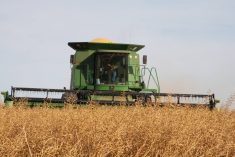Canadian agriculture is uneasy over the federal government’s trouble finding a new chief agriculture negotiator for world trade talks, a farm official told MPs last week.
Mike Dungate, general manager of Chicken Farmers of Canada, told the House of Commons agriculture committee April 21 that long-time agriculture negotiator Steve Verheul’s promotion to the head of the Canadian delegation negotiating a free trade deal with the European Union leaves Canada in the lurch as pressure increases in Geneva to reactivate stalled World Trade Organization negotiations by autumn.
“In terms of horsepower, I think we’re at a troubling time right now, losing our chief agriculture negotiator” Dungate told MPs.
Read Also

Crop quality looks good this year across Prairies
Crop quality looks real good this year, with the exception of durum.
“From what I understand, we’ve had some difficulty filling the job. While there may be a lull in negotiations that are going on right now, now is the time. This person has to build up contacts, he or she has to get up to speed on these issues and all of that.”
Dungate said if talks do resume later this year and Canada is represented by a new and inexperienced negotiator, “more will fall on ministers playing that role.”
He also reminded MPs that talks will begin on the basis of a December proposed text that Canadian supply managed industries have rejected.
“The current draft modalities text cannot in our view be the basis of negotiations,” he said.
“For us, sensitive products are the key and the text right now does not allow for enough tariff lines to cover all supply managed products. It would require us to cut our over-quota tariffs by a minimum of 23 percent and up to 70 percent if we don’t get rid of the tariff cap, and on top of that, we would have to provide another four percent to six percent of duty-free access inside of that.”
Dungate also complained about a Canadian rule that requires an imported product to be at least 88 percent chicken before it qualifies as a chicken product subject to supply management import controls.
“Canada is the only country where a product that’s 87 percent chicken, that product is not deemed to be chicken,” he said.
“So add 13 percent, some rice or stuffing and some other vegetables and all of a sudden, that escapes the tariff.”
He said the rule dates back to Canada’s commitments made in negotiations over implementation of the 1994 General Agreement on Tariffs and Trade.
Dungate said Canada’s chicken industry is geared to produce for the domestic market under the supply management quota system, but it also has an interest in trade issues.
“In terms of the imports and competing against imports of chicken from outside of Canada, I need to underscore that Canada is not a closed market for chicken,” he said.
“In fact, the 33 million Canadians are the 12th largest consumers of imported chicken in the world.”
It also exports chicken, he said, although it must contend with technical barriers based on “phony science” in potentially important markets such as the Philippines and Taiwan.
As a result, Chicken Farmers of Canada supports the government announcement that it plans to create a market access secretariat in Agriculture Canada.
















